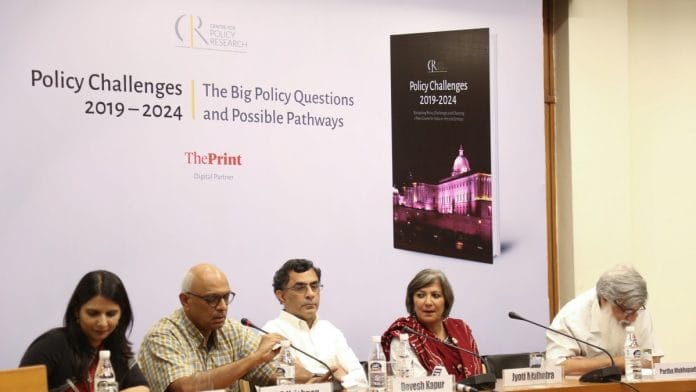New Delhi: The future of India lies in well-regulated markets, firm implementation of laws and expansion of state capacity, said a panel of experts at Centre for Policy Research’s (CPR) ‘Policy Challenges: 2019-2024’ seminar Wednesday.
The panellists were Secretary, Skill Development and Entrepreneurship, K.P. Krishnan, Director of Asia Programs at The Johns Hopkins University’s School of Advanced International Studies Devesh Kapur and ThePrint’s editor for National and Strategic Affairs, Jyoti Malhotra.
ThePrint was the digital partner of the event.
Moderating the panel discussion on ‘Future of the Indian State’ were Yamini Aiyar and Partha Mukhopadhyay from the CPR.
Asked how to manage India’s growing economy, Krishnan said, “We need to get back to the agenda of states ‘and’ markets, not states ‘versus’ markets.”
Kapur agreed and said India’s preoccupation with welfare has led to a neglect of its own growth. “We’ve run out of fresh ideas for growth. India’s 1991 model has led to greater global integration and a greater exercise in technology,” he added.
The problem is with self-governance and accountability, he said. “The strengths and weaknesses of the state reflect the strengths and weaknesses of societies,” Kapur added.
In the context of the 2019 Lok Sabha election results, which saw Narendra Modi coming to power for the second time and then promise a $5-trillion economy, Jyoti Malhotra called for moderation, “When he (Modi) spoke about India’s roadmap to a $5-trillion economy, he said it was about expanding, not shrinking the pie, so everyone could have a piece.”
“But with no fundamental reform taking place, how are you going to manage a state where demands are continuously growing?” she asked.
Also read: Need business models that can monetise crop waste to check air pollution, says TERI chief
Policy implementation
Aiyar and Mukhopadhyay shifted their focus to centre-state interaction and policy implementation.
“There’s no question of either state or Centre when it comes to implementation. Both must work together”, said Kapur to nods from the panel.
Malhotra said a fundamental problem is that states tend to not ask for more money from the Centre, especially if they are ruled by the BJP. “States quietly accept whatever sum is given to them, but that’s not pushing the envelope. That’s why some of these policies are not being properly implemented because states don’t have the money for them,” she said.
On farmer and rural distress, Kapur said, “We’ve killed our farmers with love. We’ve squeezed them so hard that they’re dying. The rich can go to the market and buy an apple, but everything the farmer does — what he sells, where he sells — is controlled.”
“It had many negative externalities and the farmers are clearly still in distress. We’re sort of thinking that the real concern is the income of the farmer, then have an income policy, not a subsidy,” he added.
PM-KISAN, Kapur said, should be altered to better suit this agenda.
Krishnan agreed to Kapur and said the state’s responsibility is beyond just handing out money to the beneficiaries. “We need to bring back citizen participation,” he added.
On state capacity
When Aiyar asked if the Indian state is burdened by the task of ensuring that everyone’s basic requirements are met, Krishnan said it is and the first step is admitting to this fact.
“What we need to do is make the state realise that it doesn’t have capacity and that there are other institutions that can fill in. Especially because these are technical, civil service issues rather than political ones,” he said.
Malhotra agreed. “The problem is that the government doesn’t like to listen to voices that contradict its own when it comes to state capacity,” she said, adding that the first step is remedying it.
ThePrint is a digital partner of Centre for Policy Research’s Policy Challenges 2019-2024 conversations.
Also read: India’s foreign policy needs strategic autonomy and more ambition, experts say






